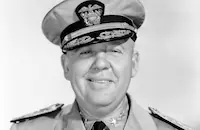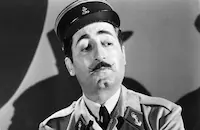The Tuttles of Tahiti

Brief Synopsis
Cast & Crew
Charles Vidor
Charles Laughton
Jon Hall
Peggy Drake
Victor Francen
Gene Reynolds
Film Details
Technical Specs

Synopsis
After three years at sea, Chester Tuttle returns home to his beloved family in Tahiti, with only a fighting rooster to show for his labor. Jonas, the shiftless family patriarch, decides to enter the bird in a match against the rooster owned by Emily, the head of a prosperous neighboring clan. To earn money to bet on the match, Jonas sends his boys out fishing, but when their boat runs out of gas, he is forced to borrow money once again from kindly Dr. Blondin. Because Jonas already owes the doctor 17,000 francs, Jensen, the devious storekeeper, convinces Blondin to ask for a mortgage on the Tuttle house as collateral. On the day of the match, Jonas bets the 10,000 francs that his sons have earned fishing, the family vanilla crop and all their furniture on the bird. When the rooster loses, the Tuttles forfeit everything, including Chester's fiancée Tamara because her mother, Emily, forbids her to marry a penniless man. When Blondin warns Jonas that he must pay his mortgage, the boys set out on another fishing trip and are battered by a raging storm. Taking refuge on an abandoned ship, the boys wait out the storm and then tow the vessel into port, where they claim the ship for themselves, according to the canons of maritime law. As the boys near land, word spreads of their arrival, and Jonas and his mother, Mama Ruau, who thought the boys perished at sea, give thanks. When Jensen offers Jonas 400,000 francs for the ship and its cargo, he accepts. Jonas then deposits the money in the bank, and after withdrawing the money he owes Blondin, gives the boys their own checkbooks. After discovering that Blondin is out of town, Jonas stashes the money in a catalog. Jonas and his boys quickly squander the rest of the money, and as a result, on the day of Chester's wedding, Jensen's men appear to repossess the Tuttle's furniture because all their checks have bounced. Emily, furious, snatches Tamara from the arms of her new husband and takes her home. Soon after, Jensen announces that the Tuttle mortgage is overdue and gives them one day to pay it. As Jonas begins to search for the catalog containing the payment, he realizes that it is lost and with it, the house. On the day that the Tuttles' land is to be sold at auction, Jonas chases Chester's bird under the house, where he finds the missing catalog. After paying the doctor, Jonas swears he will never bet again, but as he climbs into his truck, he finds his sons holding a new fighting cock, the new hope for the Tuttle fortune.

Director

Charles Vidor
Cast

Charles Laughton
Jon Hall
Peggy Drake

Victor Francen

Gene Reynolds

Florence Bates

Curt Bois
Adeline De Walt Reynolds

Mala
Leonard Sues
Jody Gilbert
Tommy Cook
Jack Carr
Jimmy Ames
Ernie Adams
Jim Spencer
Alma Ross
Teddy Infuhr
Robin Raymond
Steven Muller
Mary Shaw
Mokuola Ahu
Maxwell Reed Jr.
Birdie Debolt

Nancy Gates
Ignacio Saenz
Maile Haulani
Umi Bunkley
Herrera Twins
Fontes Twins
George Piltz
Tani Marsh
Billy Moya
John Bagni
Iren Gay
Peggy Lou Bianco
Pat Engglesson
Gilbert Leon Pineire
Billy Kalanwa
Al Kikume
Philip Ahn
Chester Gan
Grace Lem
Spencer Chan
James B. Leong

Byron Foulger

Fern Emmett
Willie Fung
Bobby Barker
George Kaluna
Frank Bruno
Lee Tung-foo
Linda Rivas
Olivia Steele
Crew
C. Bakaleinikoff
Robert Carson
Carroll Clark
Albert S. D'agostino
James Hilton
Edward Killy
Frederic Knudtson
Paul Lepere
Sol Lesser
S. Lewis Meltzer
Nicholas Musuraca
Renie
John E. Tribby
Vernon L. Walker
Roy Webb

Film Details
Technical Specs

Articles
The Tuttles of Tahiti
The film was first mentioned in the Hollywood Reporter as having the working titles of Out of Gas and later No More Gas. Originally, it was to be produced by Islin Auster, but Sol Lesser later took the helm after pre-production had begun. Laughton was to co-star with his real-life wife Elsa Lanchester as Emily (later replaced with Florence Bates) and Maureen O'Hara, who had co-starred with Laughton in Hitchcock's Jamaica Inn (1939), was briefly considered for the role as Emily's daughter; the part eventually went to Peggy Drake. Charles Vidor was assigned to direct, and the screenplay was adapted by Lewis Meltzer, Robert Carson and James Hilton.
The Tuttles of Tahiti features Laughton as the lazy Jonas Tuttle, whose handsome son Chester (Jon Hall) returns after three years at sea with nothing but a fighting rooster. Laughton decides to enter the rooster in a fight against the prized bird owned by Emily Taio (Bates), his rich neighbor and rival. Along the way is a Romeo and Juliet romance between Hall and Drake, a giant storm, and a happy ending.
The film began shooting on November 7, 1941 and extended through the Christmas holidays to late January 1942, when production was shut down due to Peggy Drake contracting pneumonia. It later resumed in February. The storm sequence, in which Chester finds an abandoned ship, cost $847,000 (the equivalent of $11 million in 2009 dollars). Modern audiences will flinch at the cock-fighting scenes, which were toned down after the PCA (Production Code Administration - the censor board that issued certificates of approval clearing American films for release) ordered the producers to remove scenes of bloodshed. In addition, the original story of an Anglo-Polynesian romance was also ordered to be changed to purely Anglo because the censors would not allow miscegenation, which was a violation of the code.
The Tuttles of Tahiti suffered from a skimpy plot and while the cast were competent actors, Laughton at least, clearly does not enjoy his role. As actor and author Simon Callow wrote in his biography of Charles Laughton, "There are of course, pleasant interludes, especially in his scenes with Florence Bates, an amateur actress, with whom Laughton, always attracted to the simplicity and directness that eluded him in his own personality, struck up a friendship. Here are the obligatory eating and chase scenes - showing him, as usual, in the one, shamelessly indulgent, in the other, comically fleet of foot, but there is no animating spirit. He acts like a little boy persuaded to play, but determined not to enjoy it. Laughton is often accused of mugging, implying a certain relish, an actor unrestrainedly indulging his favourite tricks, but that is a false definition of the word. Mugging is what an actor does when he is not engaged. He manipulates his mug into shapes, instead of reconstructing the impulses which would create those shapes. In The Tuttles, Laughton is mugging."
The Tuttles of Tahiti was not a box office success when it premiered in New York on April 29, 1942 (it went into general release on May 1st). "T.M.P.", the reviewer of The New York Times noted, "In a world of harsh realities it is pleasant to meet for a change such an irresponsible and altogether likably Puckish brood as The Tuttles of Tahiti who dropped in yesterday at Loew's Criterion. But alas! there is (or should be) a time limit even to visits from such genial and childlike folk--a social prerequisite that their RKO mentors failed to advise the Tuttles about until after they had overstayed their welcome by almost thirty minutes. An hour's visit would have been most satisfactory, for the Tuttles' enviable, carefree existence is not altogether unfamiliar."
Producer: Sol Lesser
Director: Charles Vidor
Screenplay: S. Lewis Meltzer, Robert Carson (screenplay); James Hilton (adaptation); Charles Nordhoff, James Norman Hall (novel "No More Gas")
Cinematography: Nicholas Musuraca
Art Direction: Carroll Clark, Albert S. D'Agostino
Music: Roy Webb
Film Editing: Frederic Knudtson
Cast: Charles Laughton (Jonas Tuttle), Jon Hall (Chester Tuttle), Peggy Drake (Tamara), Victor Francen (Dr. Blondin), Gene Reynolds (Ru Tuttle), Florence Bates (Emily), Curt Bois (Jensen), Adeline De Walt Reynolds (Mama Ruau), Mala (Nat), Leonard Sues (Fana).
BW-91m.
by Lorraine LoBianco
SOURCES:
The AFI Catalog of Feature Film
Callow, Simon, Charles Laughton: A Difficult Actor
"The Tuttles of Tahiti at Loew's Criterion", The New York Times , 30 Apr 42

The Tuttles of Tahiti
Quotes
Trivia
Notes
The working titles of this film were Out of Gas and No More Gas. Pre-production news items in Hollywood Reporter report the following information about the production: Islin Auster was originally slated to produce this film, which was to feature Charles Laughton and his wife, Elsa Lanchester. Maureen O'Hara was also considered for the female lead. Charles Vidor was borrowed from Columbia to direct the film and romantic lead Jon Hall was borrowed from Goldwyn for the production. An October 1941 Hollywood Reporter news item adds that Robert Carson was signed to collaborate on the screenplay after script problems threatened the start of production. When production finally began on November 7, 1941, Sol Lesser took over the production reins from Auster, who had already begun preparation for the film. This was Lesser's first production effort since joining RKO in 1941. According to a January 27, 1942 news item in Hollywood Reporter, production had to be suspended in late January when actress Peggy Drake was stricken with pneumonia.
The file on the film in the MPAA/PCA Collection at the AMPAS Library indicate that the PCA ordered the elimination of any bloodshed during the cockfight sequence in the film. Although New York Times noted that the studio changed the characters in Charles Nordoff and James Norman Hall's novel from mixed Polynesian blood to Caucasians because the Hays office did not approve miscegenation, there is no correspondence regarding this change in the PCA files.















